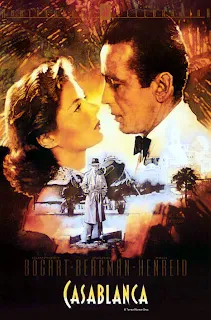Ingrid Bergman (1915-1982)
Ingrid Bergman (29 August 1915 – 29 August 1982) was a Swedish actress who starred in a variety of European and American films. She won three Academy Awards, two Emmy Awards, and the Tony Award for Best Actress. She is ranked as the fourth greatest female star of American cinema of all time by the American Film Institute. She is best remembered for her roles as Ilsa Lund in Casablanca (1942), a World War II drama co-starring Humphrey Bogart and as Alicia Huberman in Notorious (1946), an Alfred Hitchcock thriller co-starring Cary Grant.
Before becoming a star in American films, she had already been a leading actress in Swedish films. Her first introduction to American audiences came with her starring role in the English remake of Intermezzo in 1939. In America, she brought to the screen a "Nordic freshness and vitality", along with exceptional beauty and intelligence, and according to the St. James Encyclopedia of Popular Culture, she quickly became "the ideal of American womanhood" and one of Hollywood's greatest leading actresses.
After her excellent performance in Victor Fleming's remake of Dr. Jekyll and Mr. Hyde in 1941, she was noticed by her future producer David O. Selznick, who called her "the most completely conscientious actress" he had ever worked with. He gave her a seven-year acting contract, thereby supporting her continued success. A few of her other starring roles, besides Casablanca, included For Whom the Bell Tolls (1943), Gaslight (1944), The Bells of St. Mary's (1945), Alfred Hitchcock's Spellbound (1945), Notorious (1946), and Under Capricorn (1949), and the independent production, Joan of Arc (1948).
In 1950, after a decade of stardom in American films, she starred in the Italian film Stromboli, which led to a love affair with director Roberto Rossellini while they were both already married. The affair and then marriage with Rossellini created a scandal that forced her to remain in Europe until 1956, when she made a successful Hollywood return in Anastasia, for which she won her second Academy Award, as well as the forgiveness of her fans. Many of her personal and film documents can be seen in the Wesleyan University Cinema Archives.
Quotes·Quotation by Ingrid Bergman
Entertainment
¶ It's not whether you really cry. It's whether the audience thinks you are crying.
Ingrid Bergman as Ilsa Lund from Casablanca (1942)
¶ Play it, Sam. Play 'As Time Goes By.'
Ingrid Bergman as María from For Whom The Bell Tolls (1943)
¶ Maria: I do not know how to kiss, or I would kiss you. Where do the noses go?
http://en.wikipedia.org/wiki/Ingrid_Bergman



+001.jpg)


.svg.png)